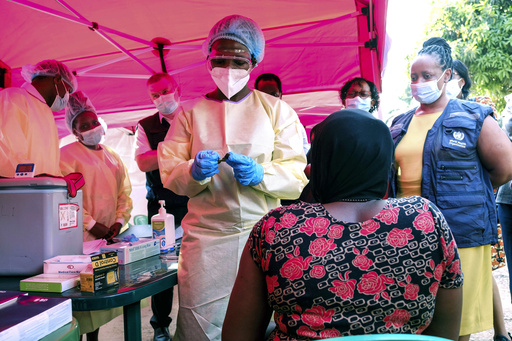KAMPALA, Uganda — On Monday, Ugandan officials commenced a clinical trial for a vaccine targeting the Sudan strain of Ebola, which has led to one death since the outbreak was declared last week.
This trial is the first of its kind aimed at evaluating the effectiveness of a vaccine against the Sudan strain, according to a statement from the World Health Organization’s Director-General Tedros Adhanom Ghebreyesus.
The study is focusing on health workers and individuals who may have been exposed to the Ebola virus. This initiative was launched just four days after the announcement of the death of a nurse in Kampala, with two additional cases reported on Monday among close relatives of the deceased.
Authorities are currently investigating the origin of this outbreak. Ebola is transmitted through contact with bodily fluids from an infected individual or through contaminated surfaces. Symptoms typically include fever, vomiting, diarrhea, muscle aches, and, in severe cases, both internal and external bleeding.
Addressing this outbreak poses considerable challenges due to Kampala’s dense and highly mobile population of approximately 4 million inhabitants. The deceased nurse had initially sought treatment at a hospital close to the capital before traveling to Mbale in eastern Uganda, where he was admitted to another public facility. Reports indicate that he also consulted a traditional healer during this time.
Health officials have identified at least 234 people who may have come into contact with the virus in the course of this outbreak.
Moreover, authorities have access to over 2,000 doses of a candidate vaccine specifically designed for the Sudan strain, although the identity of the vaccine’s developer remains undisclosed.
WHO’s Africa director, Matshidiso Moeti, remarked that this trial signifies a critical milestone in the realm of public health emergency response, emphasizing the importance of collaboration for global health security.
This outbreak marks the first case of Ebola since recent policy changes in the U.S. regarding the World Health Organization, specifically following the Trump administration’s decision to withdraw support from the U.N. health agency and the freezing of foreign aid.
Uganda has experienced several Ebola outbreaks, with a particularly devastating one in 2000 that resulted in hundreds of fatalities. Contact tracing remains an essential strategy in controlling the spread of the Ebola virus, especially given its classification as a viral hemorrhagic fever.
A vaccine known as rVSV-ZEBOV was previously used during an outbreak of the Zaire strain of Ebola in eastern Congo from 2018 to 2020, successfully vaccinating around 3,000 individuals at risk and effectively curbing the disease’s spread.
The recent confirmation of Ebola cases in Uganda adds to a troubling trend of viral hemorrhagic fever outbreaks in East Africa. Notably, Tanzania reported an outbreak of the Ebola-like Marburg disease last month, while Rwanda declared an end to its own Marburg outbreak in December.
While the animal reservoir of the Ebola virus remains unknown, it is widely believed that the initial infection in an outbreak derives from contact with an infected animal or through the consumption of its raw meat.
Ebola was first identified in 1976 during concurrent outbreaks in South Sudan and Congo, where it emerged in a village located near the Ebola River, subsequently giving the disease its name.




